Tell us the story of how you got involved in HR/People Operations and leadership. How did your career lead you here?
People call me lots of different things, Culture Architect, Team Barometer, Translator of Feelings, Employee Experience Designer, Culture Concierge. But what has been the through line for my entire life has been an innate ability to see the world differently and connect with people through global culture and shared intrinsic values.
I spent years experimenting with how I could bring this love for people and my skillset to life in a career. I thought I had found it working at Airbnb to craft the guest, host and local experience on the Experiences platform.
Eventually, it became very clear that traveling so often and the requirement of being located in Silicon Valley was no longer serving the quality of my work, and in turn, my life.
After multiple in-office panic attacks, traveling 10+ days a month and being in the constant chaos of a city, I knew there had to be a better way to do great work, wherever it worked for me.
I left everything. I broke up with my boyfriend, sold my house, moved to the middle of the mountains and realized I missed one very specific thing: solving hard problems with smart people.
My brain started reeling…there had to be people out there supporting autonomy of choice when it comes to work. What if you could create an ecosystem through shared values and experiences, regardless of real estate?
That’s when I went all in on People Operations and started working as Head of EX and Culture at a fully remote tech company and it was so fun. There was no map, there was no “one way to do this” and there were very few companies operating without the chains of an office. And boy do I love a blue ocean space!
I dove head first into anthropology and sociology research, experience design, remote-first best practices and positive psychology to bring my past and present worlds together. I watched hundreds of lives transform and the company profits skyrocket without any use of a physical office or in-person mandates.
A few years later, the pandemic hit and almost every people leader was faced with “figuring out remote” with limited knowledge, experience or resources in the space. I decided to go out on my own and now I support forward thinking people leaders to become architects of their remote-first cultures.
In which industries, verticals or sectors have you focused your career?
I’ve been all over the map! Action Sports, Hospitality, Fintech and SaaS.
Why do so many companies struggle with making HR a priority? Many say that people come first, but when it comes to budget or follow through, the reality doesn’t quite line up. What are some common mistakes companies make?
In my opinion, it has a lot to do with the language of Human Resources. We are captive of the words in which we have socially interpreted. A “resource” is something you go to only when you need something, not something that is generally integrated into the operations of a culture.
I know myself and many of my peers have also been treated as no more than a sidebar resource throughout much of my career due to socially antiquated interpretations of the department.
All that to say, the biggest mistake is not actually using language that describes the actual work “HR folks” do in relation to the strategic outcome.
You’ve been selected to give a keynote address at a major HR and leadership conference. What topic will you discuss and what major points will you touch on?
Remote-First Culture Architecture. We’d jam on the 5 key pillars to help S.H.I.F.T individual and collective mindsets to remote-first thinking:
- Setting clear expectations
- Harnessing the tools
- Inspiring Engagement
- Fostering well-being
- Training the brain.
Have you seen, firsthand, any AI impacts on the practice of people ops? What impacts are you expecting in the next few years?
These days, it’s safe to say, “there’s probably an AI for that.”
AI is definitely impacting the HR and People Operations space when it comes to recruiting, communications and employee engagement. In the next few years, I see a significant investment in AI when it comes to codifying company culture through human behavior patterns (neat!)
What skills have served you best in your career?
Imagination, adaptability, empathy, cross-cultural competence.
What’s the best advice you’d give someone just starting out in their people operations career, or just starting to transition from a related discipline?
- Approach every day as if you were a scientist: research your culture, gather data, try things out!
- Learn & present your business case for everything
- Work with people who make it safe to fail
- Manage your own psychology and be open to un-learning
- Read, a lot.
Also, write this down and stick it on your desk now: You don’t need to set yourself on fire to keep everyone else warm.
What trend do you think will be most impactful in the people ops space over the next three years?
Hire to retire employee journey mapping. Some forward-thinking leaders are already doing this, but just as most customer-focused companies map their customer journey, more teams will be adopting the practice.
What’s your biggest “hot take” or “least popular opinion” about an issue within the industry?
Not everyone needs an office to have an engaged culture.

